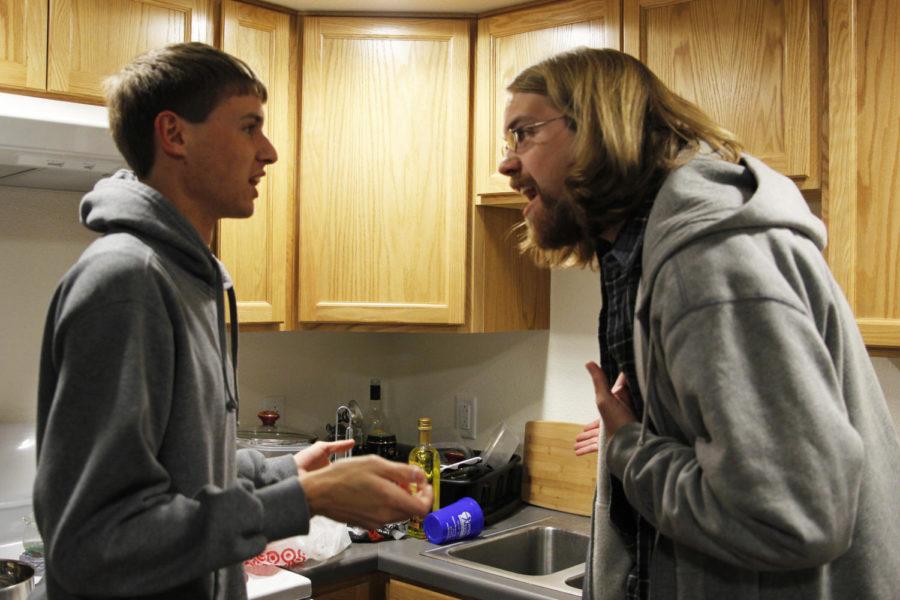Roommates can avoid disagreements during finals stress
Illustration: Kelby Wingert/Iowa State Daily
According to Lona Davenport, resident hall coordinator for Helser Hall, there are certain times of the year when students may find it more difficult to live with roommates. Davenport explains that when students are under more stress, small issues can pile up and cause an emotional outburst between roommates.
December 6, 2013
Stress may make getting along with roommates more difficult as finals close in and many students feel the strain of sleepless nights and endless studying. Students and the department of residence offer tips to avoid irritation between roommates.
“The people that are most successful in working things out with their roommates are those that are able to speak directly and with compassion and understanding with their roommate in advance,” said Lona Davenport, residence hall director for Helser Hall.
Davenport said there are certain times of the year when students may find it more difficult to live with roommates, whether they have a good relationship with each other. One of those times is six weeks into the semester when midterms and the struggles of adapting to college life fully set in for students.
Another troubling time for roommates occurs before fall break said Davenport. Davenport said many students experience homesickness towards that time of year.
On the evening of Friday, Nov. 29, ISU police responded to a dispute between two roommates at Frederiksen Court. The matter is still under investigation.
While Davenport did not want to comment on that particular incident, she said that students may be under extra stress. When under more stress, even small issues that pile up can cause an emotional outburst between roommates.
“I think that’s pretty natural just because there are a lot of demands,” Davenport said. “The Department of Residence does have a very strong relationship with the department of public safety. If students feel threatened, they absolutely should talk to the police.”
Davenport said that the Department of Residence takes many steps to ensure two or more students will be able to live agreeably with each other. In residence halls, students are asked to fill out a roommate agreement which asks residents to fill out their preferences for such things as guests, cleanliness and appropriate times for sleeping and waking up.
However, Davenport said these agreements are not always effective since many students do not have an idea of what their needs are when they fill out the agreements.
“Students who are moving in haven’t necessarily lived with someone before or haven’t lived with someone who might be very different from who they are. They come in and they might not even know that they don’t know what they want. They live together for a few weeks and they fill out this report trying to be friendly and kind and they don’t really assert their needs,” Davenport said.
Chris Fenton, junior in open option, lives in Friley Hall and gets along well with his roommate, who he said was also his best friend in high school.
Fenton said that although there may be small things that irritate each other, open communication is important and has helped him and his roommate.
“It’s gone kind of perfect,” Fenton said. “Every once in a while, I’ll ask him is there anything I’m doing that annoys him and we’ll have that conversation and then we’ll fix it. Then we’ll be fine.”
Fenton said that while he does not think he will have particularly difficult time with finals, he plans on supporting his roommate.
“I just kind of plan on backing up a little bit. If he needs me to do something for him, I’ll do it. Letting him do his thing,” Fenton said.
As for other roommates in his hall who are separating for various reasons, Fenton said he encourages them to openly and respectfully communicate about their problems.
“They’re not open about it. One person will be like, ‘I hate living with this guy,’ and the other guy will be like, ‘This is fine. We’re doing fine,’” Fenton said. “I haven’t encountered anyone that they do have problems and they’re open to each other about it.”
Davenport said that whether or not an issue between roommates is considered an emergency, all problems are meaningful and credible to the students experiencing them.
“It’s their home; it’s the place that they need to feel comfortable and able to relax,” Davenport said. “If they can’t relax in their home, then of course it’s hard, and so it doesn’t matter what the topic is actually about because it’s very meaningful to that individual.”

















